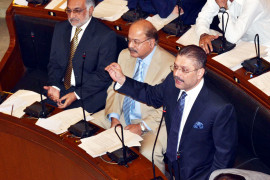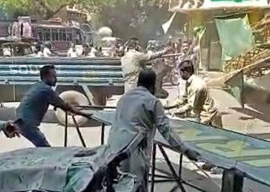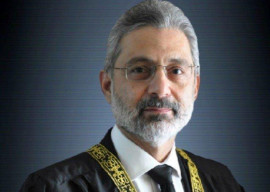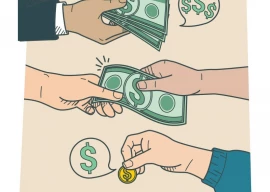
When the Frontier Constabulary and the Levies fail to provide security and justice, the Lashkar-e-Islam and the TTP step in. Similarly, the failure of the public health sector creates the space for private hospitals, which come across as money-minting machines. Often, patients with modest financial means — once admitted, end up indebted because of the huge bills accruing from consultants’ fees, multiple tests and lodging.
And once a patient walks in, the staff at these commercial health facilities pounces on them like starving vultures, making sure to fleece as much as possible. Every new patient means another money-minting object for doctors, paramedics and the administration.
Two personal experiences within last three years have exposed the brutality of the commercial nature of two prime private hospitals in Islamabad. In the first instance, a surgeon implanted three stents into my father’s artery to save his life. Ironically, the surgeon came several hours later than the time he had indicated for the procedure. He performed the procedure twice on my 87-year-old father, first for two stents and then next day for the third. Three months later, my father died of cardiac arrest. His treatment had cost more than a million rupees.
Some doctors I consulted later wondered as to why a seriously sick 87-year-old patient was made to go through an angioplasty at all. This prompted me to ask the owner of the hospital during a dinner as to whether he would recommend angioplasty for a person older than 80 years.
“No I won’t advise because such a person is already on borrowed time,” he said. Why? Because he had himself signed the documents for my father’s surgery by another known surgeon. “Oh really, did I?” was his response. He promised to get back to me, which he never did.
For over a week, the intensive care unit (ICU) of that hospital looked like a parking lot for the patients of respective surgeons and consultant physicians. Doctors were not supposed to touch other doctors’ patients. And the doctor in charge would have the moral integrity to seek a second opinion for the ailment of my mother. On a critical day, the consultant doctor didn’t show up at all and I drove him myself from his clinic to the hospital where my mother was struggling with epileptic fits.
The following few days were not different either except for a better response after we complained to the executive director of the apathy of doctors and the casual attitude of the staff at the ICU.
During our stay we witnessed another patient being ripped off for what was a simple case of hypertension; within 24 hours, this patient had to cough up almost 40,000 rupees — all this because of a false alarm that a consulting doctor had raised when the patient walked in.
What is the remedy for the common man, particularly those with limited financial resources?
There is no check on doctors who draw salaries from the government, but perform tests and surgeries at private hospitals. Tax evasion in this sector, particularly by prominent surgeons and physicians, is brazenly common. The situation is worse in smaller towns.
No accountability. Nor any sense of responsibility, and hence the rip-off, with countless patients falling victim to the insatiable greed of private hospitals.
Published in The Express Tribune, May 21st, 2014.
Like Opinion & Editorial on Facebook, follow @ETOpEd on Twitter to receive all updates on all our daily pieces.
COMMENTS (22)
Comments are moderated and generally will be posted if they are on-topic and not abusive.
For more information, please see our Comments FAQ






































@Humza you may be able to find few examples here and there but overall system in developed countries - can say for US will not allow, will not allow such freedom as in Pakistan. Check and balances in USA may not be driven by professional ethics of medical fraternity as much but there are checks and balances from payers as well as fear of fair legal system. Both these things are missing in Pakistan so it drowned professional ethics all together.
@imtiaz: I think that folks in Pakistan have a fanciful idea of how medicine in practiced in other parts of the world. For example, I have had friends and relatives come for treatment to North America for routine procedures that are otherwise available in Pakistan at a fraction of the cost and with comparable results. Often times, the care given abroad is more imagined than real. I don't dispute that abuse and negligence occurs among Pakistani physicians since it would be directly proportionate to the overall checks, safeguards and professionalism of society in general there. We know, you can't compare the standard of these things in a developing countries to any developed country.Unfortunately you have little insight as to how much pain and suffering is routinely inflicted on patients in the US when the actual benefit to the patient is negligible. I don't practice in Pakistan but in America. From nonsensical cancer surgeries on end stage cancer patients to knee and hip replacements to people who are bed ridden! Please ask any of your friends who practice abroad to confirm these types of stories to you. An attempt to denigrate the medical profession in Pakistan while blissfully unaware of the reality in what you describe as civilized societies in dubious. The point I am trying to make is that many times, benign neglect or letting the elderly die with peace and dignity is the best recourse but this is often not the case. Whether for financial reasons or for the sake of performing a procedure out of habit, many physicians have forgotten the art of medicine. There are many papers written on this topic in American Hospitals.
I totally agree with what Mr. Gul wrote and personally witnessed at Shifa International Islamabad, but I must add that government hospitals may not be different than private hospitals as (I have heard) most providers will rather refer patients to their private clinics than treating them in government hospitals. I must say most physicians in private hospitals are very competent, but lack of government oversight leave them at the mercy of owners and administrators of the hospitals with a goal of making money. We may see pathways algorithms hanging on the walls in these hospitals but most providers make decisions based on their own will rather than medical necessities. Therefore, it is important to enforce free and fair codes of conduct for healthcare providers.
All professional doctors explain the procedure in detail before doing any procedure. It is called as pre-procedure counselling. This is the doctor's duty to counsel first and then document the details explained. The documentation is extremely necessary because these days, most of the patients / relatives refuse to accept if anything wrong happens afterwards. In the case mentioned above as doctor's mistake, complete details related to patient and his file documentation should be studied before commenting anything. The author has presented his point of view.
Age is not a limit for any procedure these days. The procedural expenses are calcuated based on the successful procedural time on majority of the patients. However, some patients do behave unusually, which then leads to high expenses.
We, as a nation, are in a habit or cursing everybody without any investigation or knowledge. We shout on others on traffic rule violation but we do voilation ourselves. For example, what if the doctor mentioned by the author, would have refused the procedure due to age, then the author would have been cursing him for not doing the procedure and later death of his father?
Putting allegations without any investigation or asking opinions from non-technical persons is our habit. This habit is widely spreaded in our soceity. Our politicians, lawyers, educated class, all do the same thing. We write articles, do press conferences without any investigation.
But if the negligence of the doctor is proved, then he / she should be punished for that. If you keep society values in the mind, would you expect that all doctors would be ethical and honest? Moreover, the doctors who explain everything to the patient ethically and honestly, are termed as unexperienced in our society.
@unbelievable: Do you have any idea of how patients are abused and taken advantage of in the US. Yes there is legal recourse but the medical profession covers their mistakes well in North America. Greed exists all over the world!
Age isnt and shouldnt be a cut-off for angioplasty. I work in UK and patients in late 90s also get angioplasty done. Furthermore nor should we justify medical negligence by Indian similarities. A tough pill to swallow but our neighbours are leaps and bounds ahead of us. Until the the public health system is revamped the patients will always fall prey to the greed of private hospitals. Private healthcare is all about business nothing else.
Thanks guys and girls for reading the article - which was just a brief 600 word attempt to highlight the plight of common people. those who can afford can go anywhere, but the dominant majority is hapless and helpless - wherever they go. Age 80 plus may not be the cut off age for angioplasty but I am sure in civilized societies extreme care is taken , particularly when the patient has gone through tremendous physical pain for several weeks before being put under the knife. And am also sure that such procedures are performed in one go and not in two instalments on 87 year olds. The idea was to simply resonate helplessness at private and public hospitals
In other countries you could file a complaint with the medical board and sue the doctor and hospital for malpractice. Won't be hard to bring your own "experts" to testify that surgery/stunts on 87 year old patient is gross negligence.
This rot starts right from the GP and builds up to private hospitals.
I remember taking my 12 month old daughter to a prominent paediatrician on Margalla Road in Islamabad as he was "highly recommended". First visit cost around Rs. 2000 which was a lot of money in 1990s. Doctor asked for a follow up appointment in 2 weeks time. During this follow up visit, the doctor just asked if the patient was ok and did not even examine her. This took about all of between 5 and 10 seconds. On leaving, I was charged Rs. 2000 again.
Luckily I could afford to pay and did. But there were a lot of people there who would find it extremely difficult to pay such exorbitant fees.
And I have cursed that doctor ever since. I hope he chokes on that money. So much for the Hippcratic oath. The only oath these doctors take is one on the altar of money.
Sir, I agree with you. Thank you for writing on terrorism of doctors in the form of private hospital. I am also doctor but I am against private hospitals, I believe it is serious human rights violation. Sir, with due apologies I beg to differ the way you executed your article you should have called for ban on private practice and private hospitals of doctors. Being part of doctors fraternity I have witnessed sufferings of poor people. This is the reason why I term it serious human rights violation. In my opinion Government should raise health GDP to 10% and ban all sort of private practice and private hospitals of doctors. Pity the nation we never gave priority on health & education sector. We are topped in the ranks among illiterate and ailing nations. Sir, only sincere people like you can bring real change in Pakistan. You veteran patriot Pakistani statesman are the hope for Pakistan. To bring reforms in health sector I am with you always. Stay blessed and happy.
Doctors are also part of the people that make up this country. Since most of the businesses in this country are corrupt so is the business of health. It should not really come across as a surprise. I have seem patients going round multiple doctors for advise, and each doctor comes out with a newer and novel advise or diagnosis. It is a sad state of affairs. We as a nation have completely lost our values- today the mantra is: 'wealth by any means"
butchers
People with such mentality who rip-off poor people especially has no fear for Allah swt.....the day we have a welfare state as was during the days of our Prophets....we can live with our head high in the comity of nation.
Of course there are good and there are bad experiences .. I would like to share a few:
1- My father then 74, suffered a heart Attack, taken to Punjab Institute of Cardiology in Lahore, and the experience was amazing, not only cost was nominal (even they offered free of charge treatment upon signing a simple declaration) Surgeon was professional and staff was caring, upon discharge my sister offered a gift to the female nurse who was taking care and she refused to take it saying "patient care is what she gets paid for, so no gifts please".
2- My cooks 30 years old son suffered a paralysis attack and needed a heart valve replacement (open heart surgery) even in a government hospital it would have cost him 300,000 - 400,000, if at all they provide such surgical treatment but he got his son treated at Indus Hospital and was given totally free of charge treatment.
3- My mother was admitted in Emergency Ward of one of the top ranked private hospital in Lahore, another critical patient was admitted, staff of the ward asked the girl accompanying the patient to bring in 40,000 for the treatment immediately and they promised her that they will start treatment immediately, as soon as the girl left, Doctor said 'baba mara hoa hey, larki aaey to 40,000 ley key body discharge kar dena".
*Every new patient means another money-minting object for doctors, paramedics and the administration.** Sir, this attitude is not limited to Hospitals in Pakistan, all the private schools, colleges and Universities are the mentality towards new comers. there every new student means another money-minting object for teachers and administration as will. The main question is
What is the remedy for the common man, particularly those with limited financial resources?*
Taking my wife to Ali Medical Centre was worst decision of my life. First they induced artificial pains for a normal devilry only to create a scene for emergency c-section (normal practice for extra charges). Then they kept perfectly healthy baby in nursery for two days costing me 22000 rupees. Later on, I was fool enough to redeem their offer of "first vaccination is free" and immunised my first born with imported vaccination. It cost me approx. 10000 rupees on each visit now because doctors at government hospitals refused to immunise with different vial of vaccination. Money is not problem. But how private health care units deceive already grieved patients is shameful.
Imtiaz has missed one more fact that when State fails to provide true information private media like TTP & Lashker takes over and push their brute business in name of freedom of expression.
80 is not a cut off for angioplasty.period. i agree with the greed part of private hospitals,but same goes for govt set ups as well,by not attending to patients there. But then why focus on healthcare alone?Greed is all pervasive.
I agree with NK. I have witnessed much worse in India. Once greed comes into health care the system doesnt work. It is similar in USA but done in a more polished way and the patient doesnt come to know how he is getting ripped off because it is the insurance that pays.
@wsd: Technically there is no cut off age for stent placement - the overall health and condition of the patient are the deciding factors along with any co morbidities such as diabetes or lung disease. The same holds true for many elderly patients undergoing all manner of procedure. The point is well made that there is no need to do a particular procedure just because the procedure is available and the patient is willing to pay. I have this problem with a number of colleagues in the United States who insist on putting patients through horrible procedures when they clearly have only few months to live. Sadly a lot of the specialists with lower case loads seem to be the most aggressive when it came to these unnecessary treatments. Definitely there is a financial incentive to perform unnecessary procedures, even CT scans, but often treating physicians have forgotten that medicine is an art. Medicine is not just curing disease but also treating or providing palliative care. Worse some doctors forget their own professionalism and give in to the demands of family members who have unrealistic expectations.
Dear Imtiaz: I have had similar experiences in India. I sometimes suspect that running these hospitals is more profitable than robbing banks.
I have never heard that 80 years of age is cut off for placing stents. Yes ethical practice should be the cornerstone of any profession, unfortunately in a country where everyone is accused to be unethical be it a shopkeepers, labourers, politicians, lawyers or anyone slese